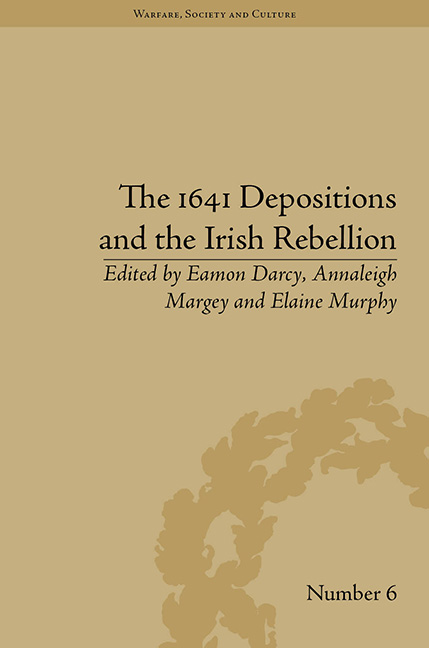Book contents
- Frontmatter
- CONTENTS
- Dedication
- Acknowledgements
- List of Contributors
- List of Figures and Tables
- List of Abbreviations
- Preface
- Introduction
- Part I The Outbreak of the Rebellion
- Part II Social Aspects of the Rebellion
- Part III Political and Military Aspects of the Rebellion
- 9 ‘Holy War’? Religion, Ethnicity and Massacre during the Irish Rebellion 1641–2
- 10 Siege of Duncannon Fort in 1641 and 1642
- 11 1641 and the Shaping of Cromwellian Ireland
- 12 The Trial of Lord Maguire and ‘Print Culture’
- Conclusion: The Rebellion in Text and Context
- Notes
- Index
9 - ‘Holy War’? Religion, Ethnicity and Massacre during the Irish Rebellion 1641–2
from Part III - Political and Military Aspects of the Rebellion
- Frontmatter
- CONTENTS
- Dedication
- Acknowledgements
- List of Contributors
- List of Figures and Tables
- List of Abbreviations
- Preface
- Introduction
- Part I The Outbreak of the Rebellion
- Part II Social Aspects of the Rebellion
- Part III Political and Military Aspects of the Rebellion
- 9 ‘Holy War’? Religion, Ethnicity and Massacre during the Irish Rebellion 1641–2
- 10 Siege of Duncannon Fort in 1641 and 1642
- 11 1641 and the Shaping of Cromwellian Ireland
- 12 The Trial of Lord Maguire and ‘Print Culture’
- Conclusion: The Rebellion in Text and Context
- Notes
- Index
Summary
Between 1641 and 1653 the three Stuart kingdoms experienced warfare on a scale that was unprecedented in early modern Britain and Ireland. In the past decades the historiography of this period has experienced a paradigm shift and historians have increasingly moved away from the notion that the British wars of the mid-seventeenth century were comparatively benign. Instead of perpetuating the traditional view that the British wars were inherently different to those fought in continental Europe, historians such as Barbara Donagan, Charles Carlton and Mark Stoyle have argued that there are more continuities between the two sets of wars than previously believed. The wars that were fought in the three kingdoms differed in nature and motivation, and thus in the levels of violence witnessed in each, but, of the three, Ireland still emerges as the kingdom which, by comparison, experienced the most vicious fighting. It was only here, it seems, that ‘humanity's full capacity for wholesale and pitiless slaughter’ was unleashed, driven by a mixture of religious and pseudo-racial contempt on the part of the English and Scottish settlers towards the native Irish and their cultural heritage. This racially defined contempt predates the Reformation, going back to the depiction of the Irish by Giraldus Cambrensis in the twelfth century and the statutes of Kilkenny of 1366. The Reformation and the refusal of the Irish to accept Protestantism intensified these prejudices even further and brought the relationship between the settlers and the native population to a new level, where the resort to violence appeared to be the only possible instrument to subdue the obdurate Irish. It was during the struggles of the Elizabethan government against the Irish rebels in the last years of the sixteenth century that the poet Edmund Spenser argued that the Irish were naturally exempt from common law and that only ‘by the extermination of their ruling elites, the starvation of the masses, and the brutality of martial law’ could they be brought from their ‘delight of licentious barbarism, unto the love of goodness and civility’.
- Type
- Chapter
- Information
- The 1641 Depositions and the Irish Rebellion , pp. 129 - 142Publisher: Pickering & ChattoFirst published in: 2014



